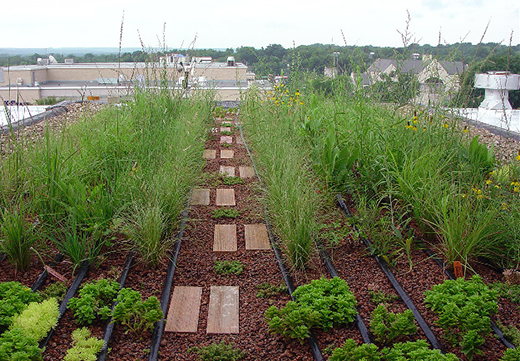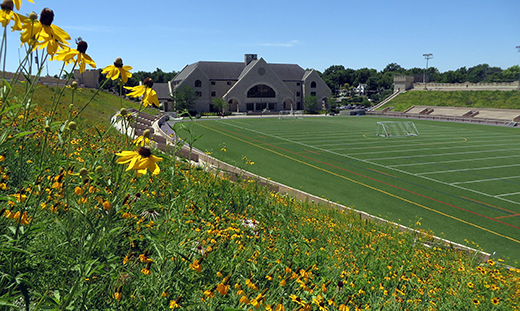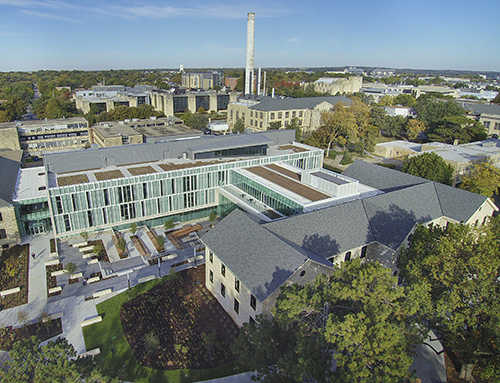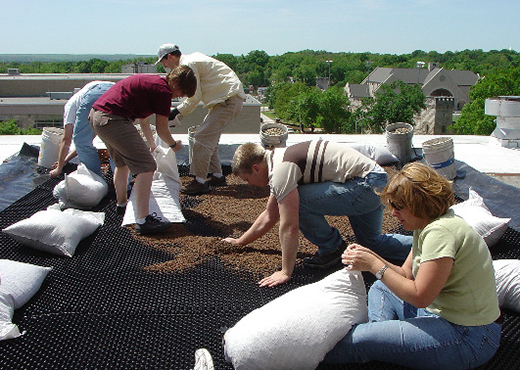Overview
Green roof research at Kansas State University is led by the Department of Landscape Architecture and Regional & Community Planning in the College of Architecture, Planning, and Design, or APDesign, with help from many other colleges on campus. Five green roofs are currently being studied at K-State: Seaton Hall Upper Green Roof, the Seaton Hall Lower Green Roof, the East Memorial Stadium Green Roof, the West Memorial Stadium Green Roof, and the APDesign Experimental Green Roof.
Seaton Hall Green Roofs
Above photo taken in 2009
In 2009, the rooftop above a third-floor breezeway on Seaton Hall was retrofitted with 15 plant species native to the central Great Plains. This semi-intensive green roof, known, as the Seaton Hall Upper Green Roof, is relatively small covering an area of only 28.5 square meters or 305 square feet. This demonstration project offered an accessible setting to observe plant vigor and survival, and develop research strategies in a region with few green roofs.
The Seaton Hall Lower Green Roof was installed in 2012 and is slightly larger than the Seaton Hall Upper Green Roof, with an area of approximately 32 square meters, or 340 square feet. This roof uses modules planted with 11 species of native plants, in addition to 10 different species of Sedum. Vegetation is irrigated as needed using potable water and rooftop runoff collected in a cistern, which demonstrates how stormwater can be captured and used to water green roof vegetation.
More information about these two green roofs.
Memorial Stadium Green Roofs
The two Memorial Stadium Green Roofs were installed in 2015 and 2016. Some of the stadium seating was removed and retrofitted with the green roofs. A combination of seed and plants from 27 native species were planted on the steeply-sloped roofs, which encompass approximately 4,000 square meters or 21,525 square feet. The vegetation coverage, soil moisture and butterfly communities are being studied for these roofs. Click here for more information.
APDesign Experimental Green Roof
October 2017 photo copyright by Tim Hursley
This green roof, located on the new APDesign building, was constructed during summer and fall 2017. The research on this roof is studying how well different plants can survive with different green roof soil types and soil depths. Monitoring was initiated in spring 2018 for vegetation growth and health, soil moisture, precipitation, air and substrate temperatures, and other variables. A total of 72 plots were created using two different regionally-available substrate types. Three different plant mixes were placed in each plot, and lie within three different substrate depths. Because deeper soils require more structural support and are more expensive to build, it is important to determine whether the extra soil depth is essential for plant survival for different soils. If deeper soils do not improve plant health, then the shallower soils could be used without the added cost. Click here for more information. (For our first international publication regarding the experimental green roof see: https://doi.org/10.1016/j.scitotenv.2019.134089).
People
This multidisciplinary effort includes faculty, staff and students assisting from APDesign; the College of Agriculture; the College of Veterinary Medicine; and the College of Arts and Sciences. Click here for more information about the people involved.



